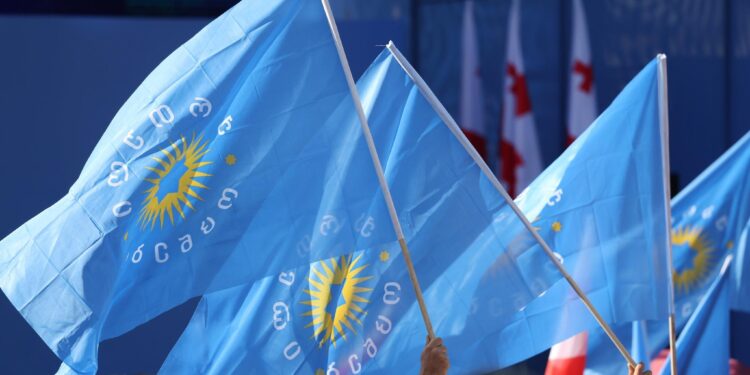A member of Georgia’s ruling Georgian Dream party has announced plans to take legal action against Estonia and Lithuania in response to sanctions imposed on him. The MP alleges that the measures are unjustified and violate his rights, escalating tensions between Georgia and the two Baltic states. This development adds a new dimension to the ongoing political friction surrounding Georgia’s domestic and foreign policy direction.
Georgian Dream MP Challenges Sanctions Imposed by Estonia and Lithuania
In a bold political move, a prominent Georgian Dream parliamentarian has announced plans to initiate legal action against Estonia and Lithuania, disputing the recent sanctions imposed on him. The MP argues that the punitive measures lack transparency and are based on unsubstantiated claims that undermine his political integrity. Describing the sanctions as “unjust and politically motivated,” he asserts that these actions significantly hinder his ability to perform his duties both domestically and internationally.
The legal challenge highlights several key points:
- Violation of due process: The MP claims Estonia and Lithuania failed to provide sufficient evidence or allow for a proper defense.
- Impact on diplomatic relations: The sanctions could strain Georgia’s ties with the Baltic states and the wider European community.
- Broader implications: This case may set a precedent for how individual politicians are targeted by foreign governments through sanctions.
| Country | Reason for Sanctions | Sanction Type |
|---|---|---|
| Estonia | Alleged political interference | Travel ban, asset freeze |
| Lithuania | Support for controversial policies | Asset freeze |
Legal Grounds and Political Context Behind the Lawsuit
The legal action initiated by the Georgian Dream MP hinges upon alleged violations of international law and diplomatic protocols by Estonia and Lithuania. The MP argues that the sanctions imposed by these two countries are unjustified, lacking proper legal basis under EU regulations and bilateral agreements. Central to the lawsuit is the claim that the sanctions infringe upon the rights of Georgian citizens and businesses, effectively causing undue economic damage without a justified cause or transparent legal process. This challenge raises significant questions about the interpretation of sanction frameworks within the European Union, particularly concerning third-country relations.
Politically, the lawsuit surfaces amid heightened tensions between Georgian Dream and Western governments, who have increasingly criticized Georgia’s internal policies and its stance towards Russia. By targeting Estonia and Lithuania directly-countries known for their staunch support of Ukraine and stringent pro-democracy policies-the MP’s strategy seems calculated to provoke debate over the political motivations underlying sanctions. The case could become a litmus test for the broader geopolitical contest in the region, illustrating how legal tools are being deployed not only in courts but also within the sphere of international diplomacy.
Implications for Baltic-Georgian Relations and Recommendations for Diplomatic Engagement
The decision by a Georgian Dream MP to initiate legal action against Estonia and Lithuania marks a significant turning point in Baltic-Georgian relations, introducing a complex layer of diplomatic strain. While both Baltic states have historically been strong supporters of Georgia’s Euro-Atlantic integration, this lawsuit could potentially erode mutual trust and cooperation. The political implications extend beyond the courtroom, threatening to overshadow shared strategic interests, including regional security and economic collaboration. It is essential for both sides to weigh the repercussions carefully, as heightened tensions may stall dialogue on critical fronts such as defense partnerships and energy transit projects.
To mitigate potential fallout, diplomatic engagement must prioritize transparent communication and conflict resolution mechanisms. Recommendations for moving forward include:
- Initiating bilateral talks involving parliamentary and executive branches to clarify legal and political positions.
- Establishing a joint monitoring group to address sanction-related grievances and prevent escalation.
- Leveraging regional platforms like the Eastern Partnership and the Council of the Baltic Sea States to maintain constructive discourse.
- Promoting public diplomacy efforts to reinforce the longstanding solidarity between Georgia and the Baltic nations.
| Strategic Area | Recommended Action | Expected Outcome |
|---|---|---|
| Legal Dialogue | Bilateral consultations | Clarified positions, reduced misunderstandings |
| Monitoring | Joint sanction oversight group | Prevention of further legal disputes |
| Regional Cooperation | Engagement in multilateral forums | Strengthened regional alliances |
| Public Relations | Information campaigns | Reinforced public support |
In Conclusion
As the legal battle unfolds, the case will test the reach and impact of international sanctions within the region, highlighting the complex interplay between national politics and diplomatic measures. Observers will be watching closely to see how Estonia and Lithuania respond to the lawsuit, and what implications it may hold for the future enforcement of sanctions imposed by neighboring countries.














